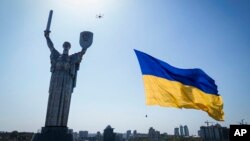Ukrainian Prosecutor General Andriy Kostin, who has called for the creation of an ad hoc international tribunal to investigate and prosecute Russian aggression in Ukraine, has registered 65,000 war crimes committed by Russian forces.
Vsevolod Knyazev, the head of Ukraine’s Supreme Court, calls it a necessary step — one that should also target Russian leaders who ordered the invasion.
“Putin will not come to the court voluntarily, and Russia will not pay voluntarily,” Knyazev tells VOA’s Ukrainian Service.
The following has been edited for length and clarity:
VOA: Ukraine is an EU candidate country. Judicial reform is considered to be an important step on the way to EU membership. How would you assess the progress in unveiling this reform?
Head of the Supreme Court of Ukraine Vsevolod Knyazev: Indeed, the tasks No. 1 and 2 on the list of European commission’s requirement for Ukraine’s EU integration are about the judicial reform. These are the most important issues for our EU partners. The first one is about the constitutional court reform that is underway. Ukraine has already adopted the legislation on the competitive selection to the judges. However, the Venice Commission has criticized the legislation. According to the bill that was signed into law, the advisory group consists of three Ukrainian and three international members, and the Venice Commission urges Ukraine to increase the number of the members representing the international community to four. If we are pursuing European integration, we shall start doing everything for our key institutions to meet European standards.
The second issue is the judicial system reform, creation of the High Council of Justice and High Qualification Commission for Judges [to approve the composition of the courts and rid them of dishonest judges]. We have already made progress here. This shall become a key element in completing the key task for us and the whole of Ukraine, which is fighting against corruption and forming a strong democratic and powerful country.
VOA: The Prosecutor General office of Ukraine registered at least 65,000 cases of war crimes allegedly committed by Russian soldiers. While Ukrainian and international courts are investigating those, there is so far no institution to investigate and prosecute the Russian leaders for the crime of aggression. Prosecutor General Kostin during his visit to Washington called on the world to create a special ad-hoc international tribunal. What is your take on such an initiative?
Knyazev: The International Criminal Court and this special tribunal shall be addressing the case against highest political and military elites [in Russia]. I fully support the idea of creating a special ad-hoc international tribunal. The international community—all the countries of the world—shall say “no” to leaders of countries that committed aggression or are intending to commit aggression. They shall be held responsible for the crime of aggression. There is no such mechanism today. Creation of such an ad-hoc international tribunal is not only important for Ukraine, there shall be some preventative mechanism. One of the goals of prosecution is prevention.
VOA: You mentioned the harm that Russia has done to Ukraine during this war of aggression. Will Ukrainian courts be addressing the issue of Russian reparations for Ukraine?
Knyazev: This is being discussed domestically in Ukraine and internationally. There are different thoughts on the mechanism through which Ukrainian citizens can get compensations for the harm done by Russia. It looks like Canada and the United States have advanced the most in this direction. Both countries have adopted the legislation, allowing to seize assets of the Russian oligarchs and then to use these funds to compensate for the harm done by Russia in Ukraine. We have a good example of that in the U.S. Putin will not come to the court voluntarily, and Russia will not pay voluntarily. The only option is to seize all these assets located abroad. These are big assets of both Putin and those oligarchs who help him wage an aggressive war. And then these assets will be used to repay the damage to Ukraine.
VOA: A Supreme Court ruling from April 14, 2022, states that Ukrainian victims of Russia’s invasion can sue Russia for the damage despite its sovereign immunity. Where does the decision stand in the balance between sovereignty and human rights?
Knyazev: Well, it's a very interesting question and a question of a great discussion inside and outside of Ukraine, because it shows that the current system of international law is not ideal. [As it now stands], one state can begin a war of aggression …. and then the victim of the war [is expected to] just respect the immunity of the [aggressor]. Our courts think that if one state starts an aggressive war, it should not expect the victim to respect that immunity. That's why [the] Supreme Court introduced a new doctrine in this part of international law.
And even now in Ukraine, we are preparing to adopt ... amendments to international law to make it possible to recover losses using the Russian assets and funds which are [recovered] inside Ukraine.
VOA: Under international law President Vladimir Putin and Russian leadership are immune and cannot be tried in Ukrainian court. Do you agree with this interpretation, and is the Supreme Court of Ukraine planning on taking this up in the future?
Knyazev: I think a very important thing is that those criminals from Russian leadership like Putin and his ministers and generals should be condemned by international bodies—should be condemned by international society to prevent starting an aggressive war in the future. The case of Putin and his highest leadership should be adjudicated by the ICC or the special international tribunal to show the world community that starting the aggressive war in modern Europe by the leadership of any country would be impossible in the future and will be punished.
This interview originated in VOA's Ukrainian Service.




